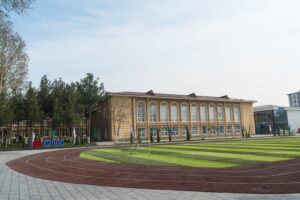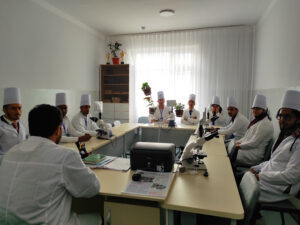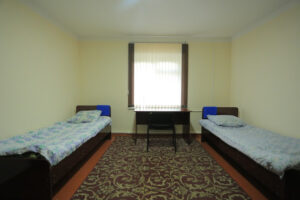- Call now
- prev
- next
Description
Fergana State Medical Institute
Fergana State Medical Institute (FSMI) is a renowned medical institution located in Fergana, Uzbekistan. Established in 1972, FSMI has played a significant role in training healthcare professionals and contributing to medical research and healthcare services in the region.

Academic Programs: FSMI offers undergraduate programs in General Medicine, Dentistry, Pharmacy, Nursing, and Public Health. These programs are designed to provide comprehensive medical education and practical training to students aspiring to become skilled healthcare professionals. The curriculum aligns with international standards and emphasizes evidence-based medicine and clinical skills.
Faculty and Research: FSMI boasts a dedicated faculty comprising experienced professors, doctors, and researchers who are actively engaged in teaching, clinical practice, and scientific research. The institute encourages faculty and student involvement in research projects addressing local and global health challenges.
Facilities and Resources: The institute is equipped with modern facilities, including lecture halls, laboratories, libraries, and clinical training centers. FSMI continually invests in upgrading its infrastructure to provide students with access to advanced learning resources and practical training opportunities.
International Collaboration: FSMI collaborates with universities, medical institutions, and organizations globally to promote academic exchanges, joint research initiatives, and international student programs. These partnerships enhance the institute's educational quality and provide students with exposure to diverse healthcare practices and perspectives.
Student Life and Support Services: FSMI offers a vibrant student life with various extracurricular activities, student clubs, and cultural events. The institute provides support services such as counseling, accommodation facilities, and career guidance to ensure a conducive learning environment for students.
Graduate Outcomes: Graduates from FSMI are well-prepared to enter diverse fields within healthcare, including clinical practice, research, academia, and public health. They contribute significantly to addressing healthcare needs in Uzbekistan and beyond, making valuable contributions to the improvement of public health and medical services.
Conclusion: Fergana State Medical Institute is a respected institution known for its commitment to excellence in medical education, research, and healthcare. With its comprehensive programs, experienced faculty, and modern facilities, FSMI continues to uphold its reputation as a leading medical institute in Uzbekistan.

Quick Facts About Fergana State Medical Institute:
| Aspect | Details |
|---|---|
| Location | Fergana, Uzbekistan |
| Establishment Year | 1972 |
| Academic Programs Offered | General Medicine, Dentistry, Pharmacy, Nursing, and Public Health |
| Accreditation | Recognized by the Ministry of Higher and Secondary Specialized Education of Uzbekistan |
| International Recognition | Recognized by the World Health Organization (WHO) |
| Faculty | Experienced professors, doctors, and researchers |
| Research Focus | Active engagement in scientific research projects |
| Facilities | Modern lecture halls, laboratories, libraries, and clinical training centers |
| International Collaboration | Partnerships with global universities and institutions for academic exchanges and joint research |
| Student Life | Vibrant student clubs, extracurricular activities, cultural events |
| Support Services | Counseling, accommodation facilities, and career guidance |
| Graduate Outcomes | Prepared for careers in healthcare, research, and academia |
| Contribution to Healthcare Sector | Significant contributions to improving public health and medical services |
Affiliation and recognition of Fergana State Medical Institute:
- Ministry of Higher and Secondary Specialized Education of Uzbekistan: FSMI is recognized and accredited by the Ministry of Higher and Secondary Specialized Education of Uzbekistan, which oversees higher education institutions in the country.
- World Health Organization (WHO): FSMI is recognized by the World Health Organization (WHO), which signifies that the institute meets international standards for medical education and training. This recognition is important for graduates seeking to practice medicine or pursue further studies internationally.
- Other Affiliations and Partnerships: FSMI likely has affiliations with local and international medical organizations, universities, and research institutions. These partnerships facilitate academic collaborations, student exchanges, joint research projects, and other initiatives that enhance the educational quality and opportunities for FSMI students and faculty.
Advantages of pursuing MBBS at Fergana State Medical Institute:
Here are the advantages of studying MBBS at Fergana State Medical Institute, summarized in simple terms:
- Quality Education: FSMI offers a high-standard medical education aligned with international norms.
- Experienced Faculty: The institute has skilled professors and doctors dedicated to student success.
- Affordable Tuition: Compared to other countries, tuition fees at FSMI are reasonable.
- Modern Facilities: Well-equipped labs, libraries, and clinical centers enhance learning.
- International Recognition: FSMI is recognized by the WHO, facilitating global career opportunities.
- Diverse Student Community: Students benefit from a multicultural learning environment.
- Career Prospects: Graduates have strong prospects in healthcare, research, and academia.
- Supportive Environment: FSMI provides comprehensive student support services.
Why study MBBS in Uzbekistan?
Studying MBBS (Bachelor of Medicine, Bachelor of Surgery) in Uzbekistan offers several compelling reasons and advantages for international students. Here are some key reasons why studying MBBS in Uzbekistan can be a good option:
- Affordable Education: MBBS programs in Uzbekistan are often more affordable compared to many other countries, making them accessible for students seeking quality education at a reasonable cost.
- High-Quality Education: Uzbekistan's medical universities, like Tashkent Medical Academy and others, offer high-quality medical education with modern facilities and experienced faculty members.
- Recognized Degrees: Medical degrees from reputable universities in Uzbekistan are recognized globally, including by international bodies like the World Health Organization (WHO), enabling graduates to practice medicine internationally.
- English-Medium Programs: Many universities in Uzbekistan offer MBBS programs taught in English, making it easier for international students to pursue their studies without a language barrier.
- Cultural Diversity: Uzbekistan is a culturally rich country with a diverse population. Studying in Uzbekistan allows students to experience a unique cultural environment and interact with people from various backgrounds.
- Clinical Exposure: Medical universities in Uzbekistan provide ample clinical exposure through affiliated hospitals and healthcare institutions, allowing students to gain practical experience during their studies.
- Safe Environment: Uzbekistan is considered a safe country for international students, with a welcoming and hospitable population.
- Gateway to Central Asia: Studying in Uzbekistan provides an opportunity to explore Central Asia and its neighboring countries, offering a rich experience beyond academics.
- Research Opportunities: Many medical universities in Uzbekistan actively engage in research, providing students with opportunities to participate in scientific projects and contribute to medical advancements.
- Affordable Cost of Living: Apart from affordable tuition fees, the cost of living in Uzbekistan is relatively low compared to many Western countries, making it more economical for international students.
Studying MBBS in Uzbekistan combines quality education, affordability, global recognition, cultural immersion, and diverse experiences, making it an attractive choice for students aspiring to pursue a career in medicine. However, students should conduct thorough research and consider their individual preferences and goals before choosing to study MBBS in Uzbekistan or any other country.
Eligibility
Fees structure
Fergana State Medical Institute in Uzbekistan for the year 2024:
| Item | 1st Year (USD) | 2nd to 6th Year (USD) | Grand Total (USD) | Grand Total (INR) (at INR 83 per USD) |
|---|---|---|---|---|
| Tuition Fees | $3,500 | $3,500 | $17,500 | Rs 14,51,500 |
| Hostel (3-4 sharing, near campus) | $600 (optional) | $600 (optional) | $3,000 (optional) | Rs 2,49,000 |
| Total | $4,100 | $3,500 | $21,500 | Rs 17,92,500 |
Other Expenses (Additional and Variable):
- Miscellaneous Yearly Charges (Visa Extension, Government Registration, Medical Insurance, etc.): Actual cost; contact for details.
- One-time Administrative Fees: Contact for details.
- Visa Charges in India: Contact for details.
- Airfares: Actual cost; contact for details.
- Food Cost: Contact for details.
- University Hostel: Hostels are available but optional and located outside the campus. Contact for details.
For further information regarding the specific expenses mentioned above and any additional costs associated with studying at Fergana Medical Institute of Public Health (FMIPH) in Uzbekistan, please contact the provided phone number: +919718519585.
Note: The conversion rate used for INR (Indian Rupees) to USD (US Dollars) is assumed to be 1 USD = Rs 83, as stated in the provided information. Actual conversion rates may vary.
Hostel
At Fergana State Medical Institute (FSMI), students have the option of choosing accommodation in hostels or arranging private accommodation near the campus. Here is some information about hostel and accommodation options at FSMI:

- Hostel Facilities:
- FSMI offers hostel facilities for students, although they are located outside the main campus.
- The hostels typically provide rooms on a sharing basis (3-4 students per room) with basic amenities such as beds, desks, chairs, and wardrobes.
- Students can opt for hostel accommodation if they prefer the convenience of living close to the institute.
- Location:
- The hostels are usually situated in close proximity to the FSMI campus, making it convenient for students to access classes and other university facilities.
- While the hostels are off-campus, they are still within a reasonable distance, allowing students to easily commute back and forth.
- Optional Accommodation:
- Accommodation in the university hostels is optional, meaning students can also choose to arrange private accommodation independently.
- Some students may prefer private accommodation for various reasons, such as personal preferences or specific living arrangements.
- Cost of Hostel Accommodation:
- The cost of hostel accommodation is typically affordable and can vary based on the facilities provided.
- Hostel fees are separate from tuition fees and other expenses, and students should inquire about the exact cost from FSMI's administration.
- Private Accommodation:
- Students who opt for private accommodation can explore rental options in nearby residential areas.
- Private accommodation offers flexibility and independence, allowing students to choose their living arrangements according to their preferences.
- Facilities and Services:
- While hostel facilities may vary, students can expect basic amenities such as common areas, shared kitchens, laundry facilities, and security measures.
- The university or hostel management typically provides essential services to ensure students' comfort and well-being.
- Local Assistance:
- FSMI's administration or student services may assist international students in finding suitable accommodation options and provide guidance on local living arrangements.

Overall, whether opting for university hostels or private accommodation, FSMI strives to ensure that students have access to suitable living arrangements that support their academic journey and overall well-being during their tenure at the institute. Students should contact FSMI directly for specific details regarding accommodation options and associated costs.



